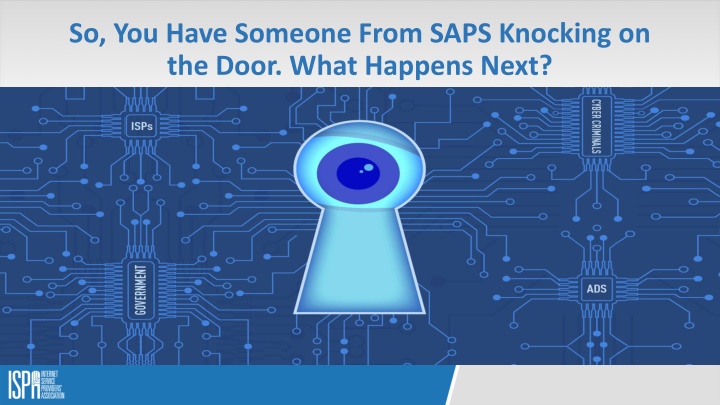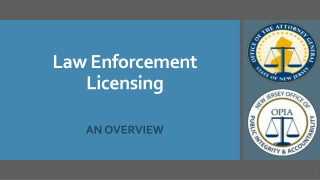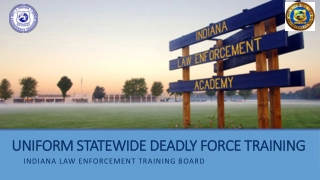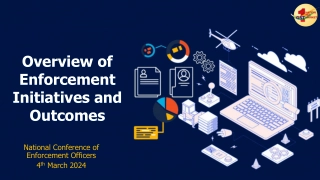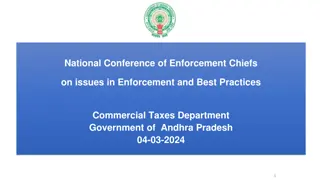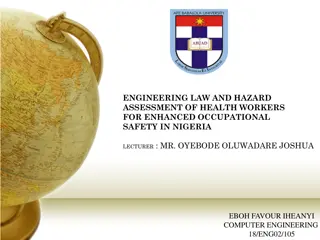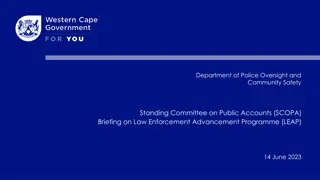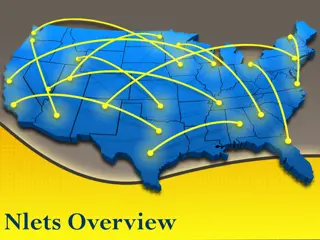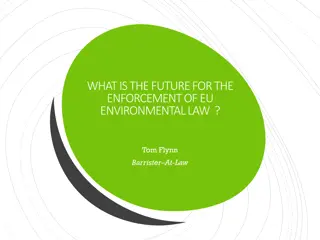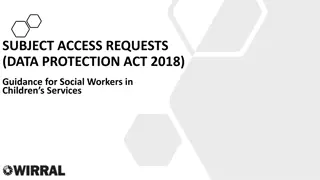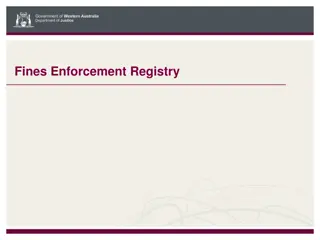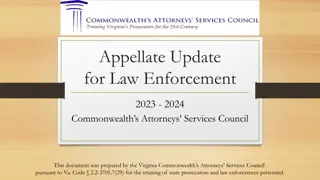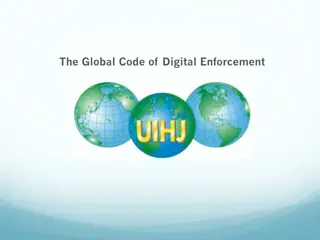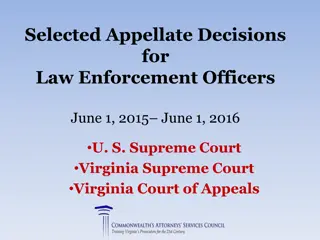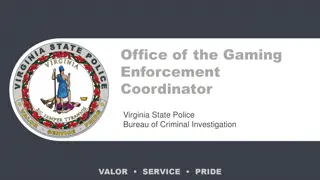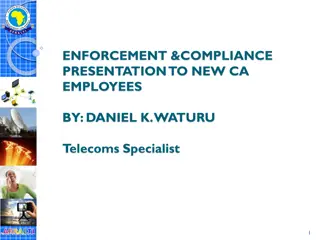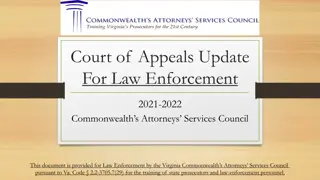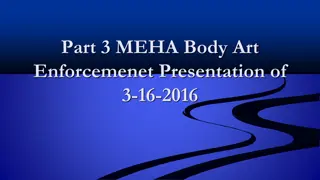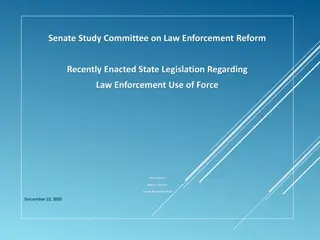Principles for Handling Law Enforcement Requests
Explore the principles guiding service providers on monitoring, reporting illegal activities, and authenticating documents when dealing with law enforcement requests. Learn the steps to follow when faced with a visit from authorities and how to handle the process effectively.
Download Presentation

Please find below an Image/Link to download the presentation.
The content on the website is provided AS IS for your information and personal use only. It may not be sold, licensed, or shared on other websites without obtaining consent from the author.If you encounter any issues during the download, it is possible that the publisher has removed the file from their server.
You are allowed to download the files provided on this website for personal or commercial use, subject to the condition that they are used lawfully. All files are the property of their respective owners.
The content on the website is provided AS IS for your information and personal use only. It may not be sold, licensed, or shared on other websites without obtaining consent from the author.
E N D
Presentation Transcript
So, You Have Someone From SAPS Knocking on the Door. What Happens Next?
principle #1: no general obligation to monitor principle #1: no general obligation to monitor 78. No general obligation to monitor (1) When providing the services contemplated in this Chapter there is no general obligation on a service provider to a) monitor the data which it transmits or stores; or (b) actively seek facts or circumstances indicating an unlawful activity. Repeated in the Cybercrimes Act However, if illegal content comes to your attention this must be reported to an LEA, and full co-operation within the law - given to those investigating
principle #2 principle #2 - - when do you become aware that when do you become aware that content or conduct is illegal? content or conduct is illegal? 54. (1) An electronic communications service provider or financial institution that is aware or becomes aware that its electronic communications service or electronic communications network is involved in the commission of any category or class of offences provided for in Part I of Chapter 2 and which is determined in terms of subsection (2), must ___ 27A(2) If an internet access provider has knowledge that its services are being used for the hosting or distribution of child pornography, propaganda for war, incitement of imminent violence or advocating hatred based on an identifiable group characteristic and that constitutes incitement to cause harm, such internet service provider shall
principle #3: process is everything principle #3: process is everything Verify the authenticity of an issued document Original signed and stamped by a magistrate / judge / senior police official / senior SARS official Service in person At the very least: official letterhead + sanity test Be firm and polite: in the absence of proper procedure confirm that you will gather and secure evidence pending correct documentation being presented Make sure you clearly understand what is required: you can go back with questions Comply as accurately as possible with the request: do not exceed the terms but bring evidence not covered by the request to the attention of the law enforcement agency Provide information securely: best to agree on how this will be done with the person named on the process as your contact. Obtain a receipt for collection. You are permitted to retain a copy, of the request; unless otherwise instructed keep the fact and substance of the request confidential and do not inform targeted subscriber
South African Police Services South African Police Services During 2024 will move from Criminal Procedure Act (CPA) requests to CPA + Cybercrimes Act (CA) requests CPA Requests relatively commonplace and process well-established Usually related to general criminal offences murder, fraud etc Section 205 subpoena process well-established CA Standard Operating Procedures (SOPs) Expedited preservation of data direction Preservation of evidence direction Disclosure direction Waiting for the forms which are to be used for these
ISPs and CSAM ISPs and CSAM Any activity related to the possession, manufacture or distribution of CSAM must be reported to SAPS Once you have a reasonable suspicion that content you are hosting is CSAM Take all reasonable steps to prevent access by any person Report to a police official of the SAPS Take all steps to preserve evidence Failure to report may result in criminal charges Further distribution may result in criminal charges Failure to train staff do deal with requests or on how to respond to discovering CSAM places your business at risk Put a simple internal policy in place on the procedure to be followed
South African Revenue Services South African Revenue Services SARS also has broad powers to request information from ISPs to obtain personal information of taxpayers required for the administration of a tax Act Request should specify: The relevant tax Act Sufficient detail of the required information Why the requested information is relevant to the administration of the tax Act SARS can be quite grumpy when it comes to requests Predominantly sent by email Insist upon a formal request on an official letterhead, stating the name and position of the sender Use practical sense to verify Telephone call Deliver to SARS offices
miscellaneous requests miscellaneous requests Financial Services Board: Financial Markets Act allows requests, where directed by a supervisory authority. Request must specify: The offence or contravention being investigated + the information required in sufficient detail + the relevance of the information Parties to court proceedings: No obligation on an ISP to provide information which relates to their customers in the absence of a court order, summons or subpoena Discovery and inspections Harassment / Domestic violence / Maintenance: simple, inexpensive procedure by which clerk of court can issue a direction to an ECSP to provide it with information about the sender of the harassing communications as also content of those communications Promotion of Access to Information: access to records or/and information held by e.g. an ISP that is required for the exercise or protection of any rights Grounds for refusal: private / confidential / commercially sensitive information What about POPIA?
2024 2024+ + Cybercrimes Act implementation Data and Cloud Policy Cybersecurity Bill Classification of data Critical information infrastructure New government structures RICA Amendment Bill Customer registration Interception & monitoring General Intelligence Laws Amendment Bill 20223 (GILAB 2023)
ISPAs role ISPA s role Acts as an initial point of contact for SAPS Provides advisories and advice to members to ensure lawful compliance with subpoenas Regularly engages with SAPS personnel specialising in cybercrime Maintains an updated list of ECSPs who are ISPA members for: DoJCD under the Protection from Harassment Act and DCDT under the Domestic Violence Act Early involvement in development of policy, legislation and regulation Training First level support for members
